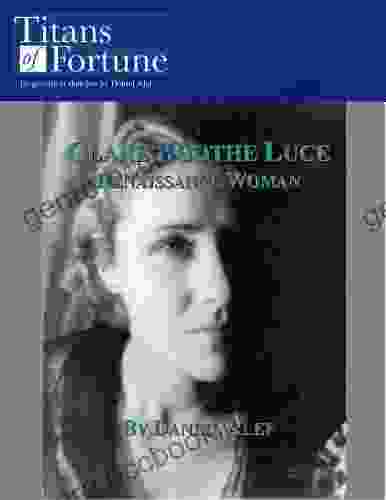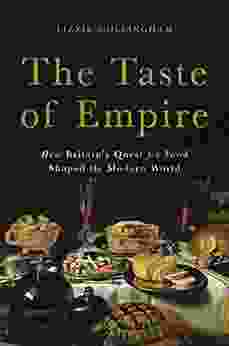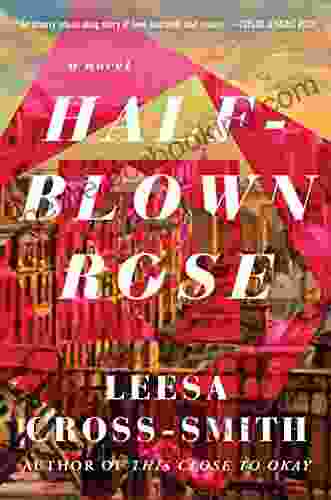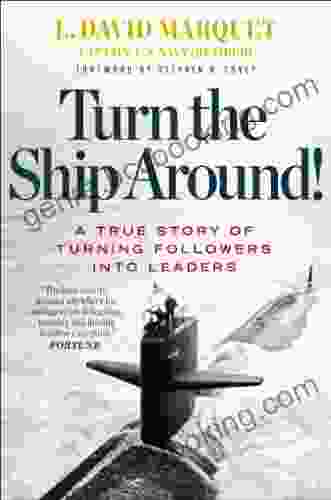How Britain's Quest for Food Shaped the Modern World

Britain's quest for food has been a driving force behind the development of the modern world. From the spice trade to the development of new agricultural technologies, Britain's search for food has had a profound impact on global history.
4.4 out of 5
| Language | : | English |
| File size | : | 75841 KB |
| Text-to-Speech | : | Enabled |
| Screen Reader | : | Supported |
| Enhanced typesetting | : | Enabled |
| Word Wise | : | Enabled |
| Print length | : | 324 pages |
In the Middle Ages, Britain was a relatively poor and undeveloped country. Its climate was not conducive to growing a wide variety of crops, and the country's population was often on the brink of starvation. However, Britain's location on the coast gave it access to the sea, and its people began to turn to the ocean for food.
In the 15th century, British explorers began to sail to the East Indies in search of spices. Spices were highly prized in Europe, and they could be used to preserve food, flavor dishes, and even cure diseases. The spice trade quickly became a major source of wealth for Britain, and it helped to fuel the country's economic development.
The spice trade also had a major impact on British cuisine. Spices such as pepper, cinnamon, and nutmeg were introduced to Britain, and they quickly became essential ingredients in many dishes. British cooks also began to experiment with new ways to use spices, and they developed a unique style of cuisine that is still enjoyed today.
In the 18th and 19th centuries, Britain's quest for food led to the development of new agricultural technologies. The invention of the seed drill and the plow helped to increase crop yields, and the development of new breeds of livestock led to improvements in meat production. These new technologies helped to feed Britain's growing population, and they also helped to make Britain one of the leading agricultural nations in the world.
Britain's quest for food has also had a major impact on the environment. The clearing of land for agriculture has led to deforestation and soil erosion, and the use of pesticides and fertilizers has polluted the environment. However, Britain has also been a leader in developing sustainable agricultural practices, and the country is now at the forefront of the movement to protect the environment.
The story of Britain's quest for food is a fascinating one. It is a story of exploration, innovation, and triumph. It is also a story of the profound impact that food has had on the development of human civilization.
Table of Contents
- Chapter 1: The Spice Trade
- Chapter 2: The Development of Agricultural Technologies
- Chapter 3: The Impact of Food on British Cuisine
- Chapter 4: The Environmental Impact of Food Production
- Chapter 5: The Future of Food
Chapter 1: The Spice Trade
The spice trade was one of the most important factors in the development of modern Britain. Spices were highly prized in Europe, and they could be used to preserve food, flavor dishes, and even cure diseases. The spice trade quickly became a major source of wealth for Britain, and it helped to fuel the country's economic development.
In the 15th century, British explorers began to sail to the East Indies in search of spices. The Portuguese had already established a monopoly on the spice trade, but the British were determined to break it. In 1600, the British East India Company was founded, and it quickly became one of the most powerful companies in the world. The East India Company controlled the spice trade for over two centuries, and it helped to make Britain one of the richest countries in Europe.
The spice trade had a major impact on British cuisine. Spices such as pepper, cinnamon, and nutmeg were introduced to Britain, and they quickly became essential ingredients in many dishes. British cooks also began to experiment with new ways to use spices, and they developed a unique style of cuisine that is still enjoyed today.
Chapter 2: The Development of Agricultural Technologies
In the 18th and 19th centuries, Britain's quest for food led to the development of new agricultural technologies. The invention of the seed drill and the plow helped to increase crop yields, and the development of new breeds of livestock led to improvements in meat production. These new technologies helped to feed Britain's growing population, and they also helped to make Britain one of the leading agricultural nations in the world.
The seed drill was invented in the 18th century by Jethro Tull. The seed drill allowed farmers to plant seeds more evenly and at a more consistent depth. This led to increased crop yields, and it also helped to reduce the amount of labor required to plant crops.
The plow was also invented in the 18th century. The plow was a more efficient way to turn the soil than the traditional spade. This led to increased crop yields, and it also helped to reduce the amount of labor required to prepare fields for planting.
The development of new breeds of livestock also led to improvements in meat production. In the 18th century, Robert Bakewell developed new breeds of sheep and cattle that were more productive and more resistant to disease. These new breeds of livestock helped to increase the supply of meat, and they also helped to improve the quality of meat.
Chapter 3: The Impact of Food on British Cuisine
The quest for food has had a major impact on British cuisine. The of spices to Britain in the 15th century led to the development of new dishes and flavors. The development of new agricultural technologies in the 18th and 19th centuries led to increased food production, which made it possible for more people to eat a wider variety of foods.
Today, British cuisine is a diverse and flavorful mix of traditional dishes and international influences. Some of the most popular British dishes include fish and chips, roast beef
4.4 out of 5
| Language | : | English |
| File size | : | 75841 KB |
| Text-to-Speech | : | Enabled |
| Screen Reader | : | Supported |
| Enhanced typesetting | : | Enabled |
| Word Wise | : | Enabled |
| Print length | : | 324 pages |
Do you want to contribute by writing guest posts on this blog?
Please contact us and send us a resume of previous articles that you have written.
 Book
Book Novel
Novel Page
Page Chapter
Chapter Text
Text Story
Story Genre
Genre Reader
Reader Library
Library Paperback
Paperback E-book
E-book Magazine
Magazine Newspaper
Newspaper Paragraph
Paragraph Sentence
Sentence Bookmark
Bookmark Shelf
Shelf Glossary
Glossary Bibliography
Bibliography Foreword
Foreword Preface
Preface Synopsis
Synopsis Annotation
Annotation Footnote
Footnote Manuscript
Manuscript Scroll
Scroll Codex
Codex Tome
Tome Bestseller
Bestseller Classics
Classics Library card
Library card Narrative
Narrative Biography
Biography Autobiography
Autobiography Memoir
Memoir Reference
Reference Encyclopedia
Encyclopedia Leanda De Lisle
Leanda De Lisle Nita A Martin
Nita A Martin Kyriacos C Markides
Kyriacos C Markides Lisa Mason Ziegler
Lisa Mason Ziegler Richard Headstrom
Richard Headstrom Laurie Katz
Laurie Katz Susan C Pinsky
Susan C Pinsky Linda Liu
Linda Liu Stephan Weaver
Stephan Weaver Linda Tuhiwai Smith
Linda Tuhiwai Smith Leigh Alexander
Leigh Alexander Laura Lippman
Laura Lippman Laura Busche
Laura Busche Terry M Redding
Terry M Redding Mitchell Zuckoff
Mitchell Zuckoff Laurence Moroney
Laurence Moroney Tony Bartelme
Tony Bartelme Melissa Febos
Melissa Febos Lisa Jewell
Lisa Jewell Lavinia Honeyman Porter
Lavinia Honeyman Porter
Light bulbAdvertise smarter! Our strategic ad space ensures maximum exposure. Reserve your spot today!

 Ralph Waldo Emerson100 Things Stars Fans Should Know & Do Before They Die: The Ultimate...
Ralph Waldo Emerson100 Things Stars Fans Should Know & Do Before They Die: The Ultimate... Ernesto SabatoFollow ·13.4k
Ernesto SabatoFollow ·13.4k Eddie PowellFollow ·17.3k
Eddie PowellFollow ·17.3k Ian PowellFollow ·16.5k
Ian PowellFollow ·16.5k Mark MitchellFollow ·8.1k
Mark MitchellFollow ·8.1k Dave SimmonsFollow ·2.9k
Dave SimmonsFollow ·2.9k Jace MitchellFollow ·10.5k
Jace MitchellFollow ·10.5k Brennan BlairFollow ·2.7k
Brennan BlairFollow ·2.7k Todd TurnerFollow ·13.9k
Todd TurnerFollow ·13.9k

 Branden Simmons
Branden SimmonsUnveiling the World of Tequila: A Collector's Guide to...
: Prepare to embark on a tantalizing journey...

 Chuck Mitchell
Chuck MitchellHazel McCallion and the Development of Mississauga: A...
: The Matriarch of Mississauga Hazel...

 Lucas Reed
Lucas ReedUnveiling the Hidden Treasures of Tequila, Mezcal, and...
Prepare to be captivated...

 Isaias Blair
Isaias BlairBusinesses With Stories: The Power of Storytelling in...
In today's competitive business environment,...

 Ethan Gray
Ethan GrayUnveiling the World of Tequila, Mezcal, and Sotol: The...
Embark on a...

 Barry Bryant
Barry BryantClare Boothe Luce: Renaissance Woman
In the annals of history, few...
4.4 out of 5
| Language | : | English |
| File size | : | 75841 KB |
| Text-to-Speech | : | Enabled |
| Screen Reader | : | Supported |
| Enhanced typesetting | : | Enabled |
| Word Wise | : | Enabled |
| Print length | : | 324 pages |










